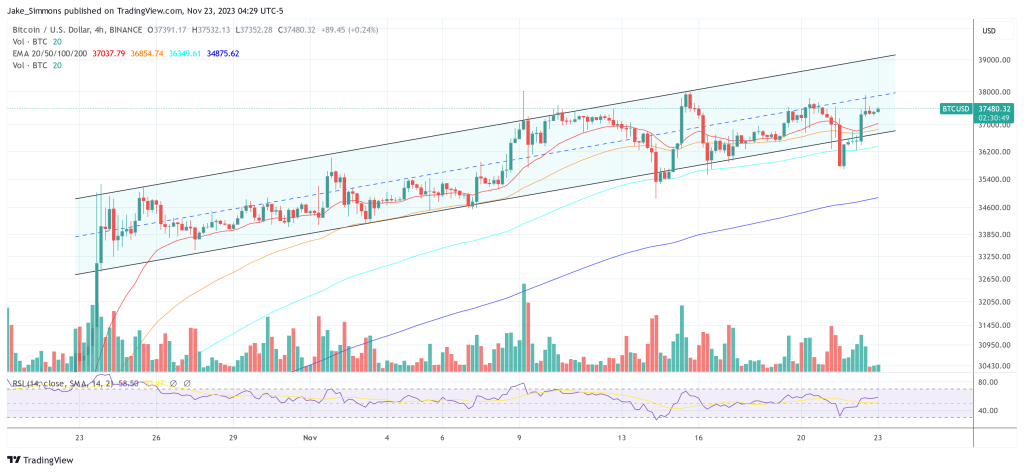- November 23, 2023
- Posted by: admin
- Category: BitCoin, Blockchain, Cryptocurrency, Investments
The Kingdom of Bhutan, traditionally known for its pursuit of Gross National Happiness, has been engaging in a covert but extensive Bitcoin mining operation.
According to Forbes, Bhutan has secretly spent millions building a national Bitcoin mining operation to avert an economic crisis. While it was revealed earlier this year that the Himalayan country mines Bitcoin, the extent was a mystery.
Forbes’ journalists Iain Martin and Sarah Emerson, leveraging insider sources and satellite imagery from multiple agencies, have now exposed the covert operations of what is now known as the world’s largest state-owned Bitcoin mines.
Bhutan Pours In Millions Of Dollars For Bitcoin Mining
According to Forbes, dozens of shipping containers, housing millions of dollars in Bitcoin mining machinery, are discreetly placed behind a hillside south of Thimphu, effectively hidden from the public eye. This revelation follows Bhutan’s discreet commencement of a sovereign Bitcoin mining venture approximately four years ago.
Bhutan’s strategic initiative involved the allocation of land, energy, and substantial funding towards these mining operations, potentially to counteract an impending economic crisis. The locations of these facilities, until now undisclosed, have been identified by Forbes through corroborated sources and satellite data from Planet Labs, Satellite Vu, and Google Earth.
The report details four suspected mining sites, with the first near Dochula Pass, a site of cultural and political significance. Satellite imagery indicates that construction began in 2020 and concluded in late 2022, with the mining units camouflaged by extensive forestation. Another mining site is near Trongsa, with additional facilities in the district of Dagana and on the site of the former Education City project, which had been a failed $1 billion initiative.
Customs data also reveals that around December 2021, Bhutan imported $193 million worth of “processing units,” with a tariff code consistent with Bitcoin mining hardware. This aligns with a surge in the country’s power consumption by the industry in 2022, a spike of 63%, and an increase in electricity imports, which have been attributed in part to the power demands of Bitcoin mining.
Bhutan’s Druk Holdings & Investment (DHI) confirmed the existence of mining-related facilities but withheld details, citing commercial sensitivity. Nevertheless, the country’s foray into Bitcoin mining was seen as a bold step to diversify its economic strategy, which traditionally relied on tourism and hydropower exports.
The country’s engagement with Bitcoin became particularly aggressive around 2020, a period of BTC’s valuation fluctuations and Bhutanese economic challenges. Interestingly, DHI disclosed a net positive position in its digital asset investments despite Bitcoin’s price volatility.
Bhutan’s trade data also points to over $220 million in mining chip imports from China between 2021 and 2022. However, DHI has remained tight-lipped about these transactions, alluding to nondisclosure agreements.
Cementing The Position As Largest Nation-State Miner
The report also delves into Bhutan’s partnership with Bitdeer, a Singapore-based Bitcoin mining giant. This collaboration marked a significant expansion of Bhutan’s Bitcoin mining endeavors. In 2022, Bitdeer commenced a new mining project in the southern town of Gedu.
According to Bitdeer’s disclosure, the Gedu mine brought online 100 megawatts (MW) of capacity in August, with plans to expand to a staggering 600 MW. This scale of operation would surpass the nation’s current energy consumption. Bitdeer reported running 11,000 miners initially and ordering an additional 15,000 machines, underlining the immense scale and ambition of the project.
The report comes at a time when Bhutan’s economic growth is forecasted to slow, and its government’s economists are calling for reforms. Yet, the country’s commitment to blockchain solutions continues to be robust, as demonstrated by the recent launch of a decentralized digital identity app, tested by none other than the crown prince himself.
At press time, BTC traded at $37,480.
